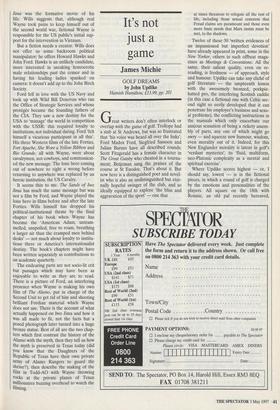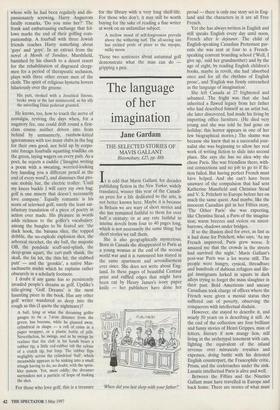It's not just a game
James Michie
GOLF DREAMS by John Updike Hamish Hamilton, £13.99, pp. 201 Great writers don't often interlock or overlap with the game of golf. Trollope had a stab at St Andrews, but was so frustrated that 'his voice was heard all over the links'; Ford Madox Ford, Siegfried Sassoon and Julian Barnes have all described rounds; Scott Fitzgerald has a female character in The Great Gatsby who cheated in a tourna- ment; Betjeman sang the praises of the course at St Enodoc. That's about it. But now here is a distinguished poet and novel- ist who is also an undistinguished but eter- nally hopeful swinger of the club, and so ideally equipped to explore 'the bliss and aggravation of the sport' — one that
at times threatens to relegate all the rest of life, including those sexual concerns that Freud claims are paramount and those even more basic needs that Marx insists must be met, to the shadows.
Twelve of these 30 'written evidences of an impassioned but imperfect devotion' have already appeared in print, some in the New Yorker, others in such offbeat maga- zines as Meetings & Conventions. All the same, their salient quality, even on re- reading, is freshness — of approach, style and humour. Updike can take any cliché of golf literature — the umpteenth lesson with the awesomely bronzed, porkpie- hatted pro, the interfering Scottish caddie (in this case a fictional one with Celtic sec- ond sight so eerily developed that it can penetrate his employer's business and sexu- al problems), the conflicting instructions in the manuals which only exacerbate our anxious sensation of being a rickety assem- bly of parts, any one of which might go awry — and squeeze new humour, wisdom, even morality out of it. Indeed, for this New Englander morality is latent in golf's `verdant mysteries', its 'fluid, multiform, neo-Platonic complexity as a mental and spiritual exercise'.
Where Updike scores highest — or, I should say, lowest — is in the fictional pieces, in which a round of golf is charged by the emotions and personalities of the players. All square on the 18th with Ronnie, an old pal recently bereaved, whose wife he had been regularly and dis- passionately screwing, Harry Angserom fatally remarks, `Do you miss her?' The frank and embarrassing exchange that fol- lows marks the end of their golfing com- panionship. A fourball with three Jewish friends teaches Harry something about `guys' and 'goys'. In an extract from the novel A Month of Sundays, Marshfield, banished by his church to a desert resort for the rehabilitation of disgraced clergy- men for a period of therapeutic seclusion, plays with three other errant men of the cloth. The spirit of religious hysteria hovers hilariously over the greens:
His putt, stroked with a Jesuitical finesse, broke away at the last minisecond, as his ally the snivelling Dixie pederast grunted.
He knows, too, how to touch the nerve of nostalgia, reviving the days when, for a nugatory fee, one could drift round a first- class course neither driven into from behind by unmannerly, rainbow-kitted ignoramuses with too many clubs in the bag for their own good, nor held up by corpo- rate foreign fourballs squatting toadlike on the green, laying wagers on every putt. As a poet, he rejects a caddie (`Imagine writing a poem with a sweating, worried-looking boy handing you a different pencil at the end of every word'), and dismisses that pro- saic mobile bar, the electric trolley: 'Until my knees buckle I will carry my own bag; golf is one misery that doesn't necessarily love company.' Equally romantic is his scorn of televised golf, surely the least sat- isfactory translation of a piece of poetry in action ever made. His pleasure in words adds richness to the golfer's vocabulary: among the bungles to be feared are 'the duck hook, the banana slice, the topped dribble, the no-explode explosion shot, the arboreal ricochet, the sky ball, the majestic OB, the pondside scuff-and-splash, the deep-grass squirt, the cart-path shank, the skull, the fat hit, the thin hit, the stubbed putt' — and the `gronlde', a native Mas- sachusetts mishit which he explains rather obscurely in a scholarly footnote.
I doubt if any game has so persistently invaded people's dreams as golf. Updike's title-giving 'Golf Dreams' is the most haunting piece in the book. Has any other golf writer wandered so deep into the rough as this (I quote the nightmare)?
A ball, lying at what the dreaming golfer gauges to be a 7-iron distance from the green, has become, while he glanced away, cylindrical in shape — a roll of coins in a paper wrapper, or a plastic bottle of pills. Nevertheless, he swings, and as he swings he realises that the club in his hands bears a rubber tip, a little red-rubber tab the colour of a crutch tip, but limp. The rubber flips negligibly across the cylindrical 'ball', which meanwhile appears to be sinking into a small trbugh having to do, no doubt, with the sprin- kler system. Yet, most oddly, the dreamer surrenders not a particle of hope of making the shot.
For those who love golf, this is a treasure for the library with a very long shelf-life. For those who don't, it may still be worth buying for the sake of reading a fine writer at work on an unfamiliar subject.
A mellow mood of self-forgiveness prevails above the withering turf. The all-seeing sun has yielded pride of place to the myopic, milky moon.
Those two sentences about autumnal golf demonstrate what the man can do gripping a pen.



































































 Previous page
Previous page